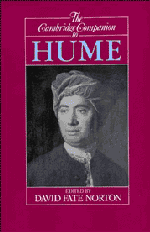Book contents
- Frontmatter
- 1 An introduction to Hume's thought
- 2 Hume's new science of the mind
- 3 Hume and the philosophy of science
- 4 Hume's scepticism
- 5 Hume's moral psychology
- 6 Hume, human nature, and the foundations of morality
- 7 The structure of Hume's political theory
- 8 David Hume: Principles of political economy
- 9 Hume's literary and aesthetic theory
- 10 David Hume, "the historian"
- 11 Hume on religion
- Appendix: Hume's autobiographies
- Bibliography
- Index of Names and Subjects
- Index of Citations and References
4 - Hume's scepticism
Published online by Cambridge University Press: 28 May 2006
- Frontmatter
- 1 An introduction to Hume's thought
- 2 Hume's new science of the mind
- 3 Hume and the philosophy of science
- 4 Hume's scepticism
- 5 Hume's moral psychology
- 6 Hume, human nature, and the foundations of morality
- 7 The structure of Hume's political theory
- 8 David Hume: Principles of political economy
- 9 Hume's literary and aesthetic theory
- 10 David Hume, "the historian"
- 11 Hume on religion
- Appendix: Hume's autobiographies
- Bibliography
- Index of Names and Subjects
- Index of Citations and References
Summary
By all that has been said the reader will easily perceive, that the philosophy contain'd in this book is very sceptical, and tends to give us a notion of the imperfections and narrow limits of human understanding. Almost all reasoning is there reduced to experience; and the belief, which attends experience, is explained to be nothing but a peculiar sentiment, or lively conception produced by habit. Nor is this all, when we believe any thing of external existence, or suppose an object to exist a moment after it is no longer perceived, this belief is nothing but a sentiment of the same kind. Our author insists upon several other sceptical topics; and upon the whole concludes, that we assent to our faculties, and employ our reason only because we cannot help it. Philosophy wou'd render us entirely Pynhonian, were not nature too strong for it.
(A, 657)The above passage comes from a pamphlet written by David Hume to secure a readership for his largely unappreciated Treatise of Human Nature. Though not successful in this regard, the Abstract remains a valuable guide to Hume's Treatise, for it offers his own assessment of the significance of that work. Here, at least, Hume is unequivocal in describing his philosophy as “very sceptical.” But even if Hume describes his philosophy in this way, and even if, at the time, his philosophy was almost universally taken in this light, it remains unclear, first, what this scepticism amounts to and, second, how this scepticism is related to other aspects of his philosophical program. The goal of this essay is to answer both of these questions. I begin by giving a broad sketch of the role of scepticism in Hume's philosophy and then, in succeeding sections, offer a detailed analysis of the central sceptical arguments.
- Type
- Chapter
- Information
- The Cambridge Companion to Hume , pp. 90 - 116Publisher: Cambridge University PressPrint publication year: 1993
- 35
- Cited by



